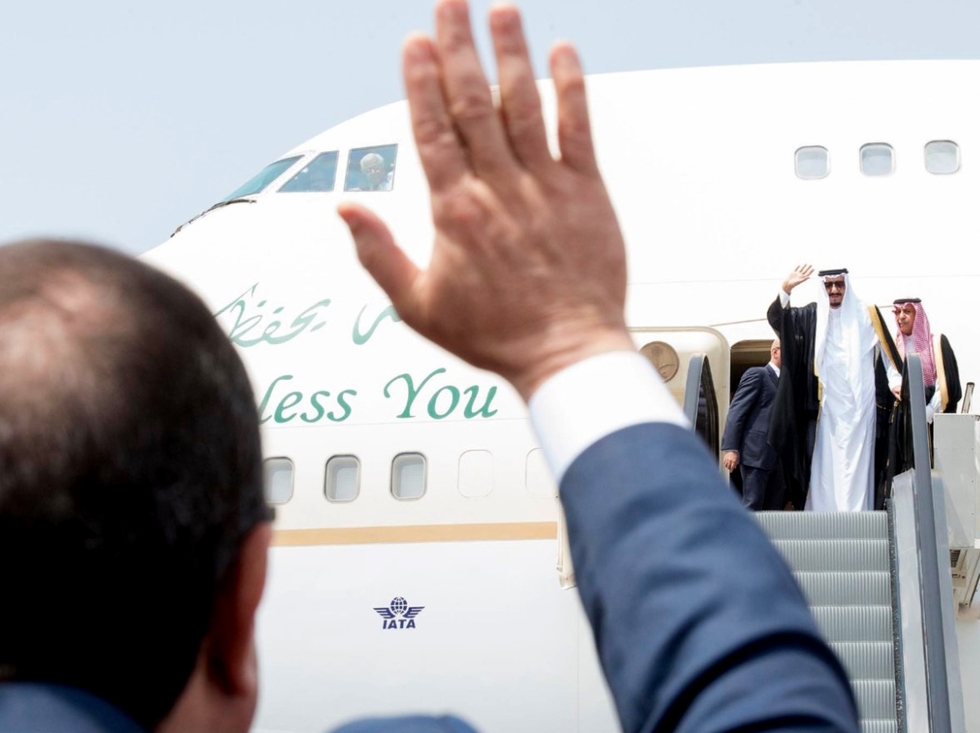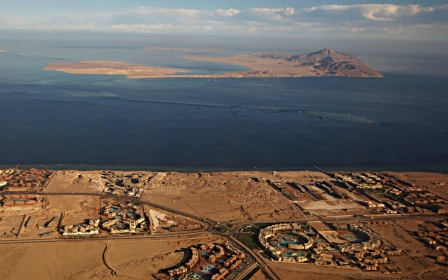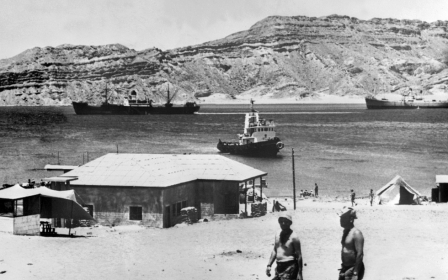Arabic press roundup: Anger in Egypt as Sisi accused of selling islands

Saudi King Salman’s five-day visit to Egypt has been overshadowed by news that Egypt has agreed to hand control of two strategic islands to its rich Gulf ally, a surprising announcement that has caused massive controversy in Egypt, even among the political allies of President Abdel Fattah al-Sisi.
The visit of the king resulted in a maritime boundary agreement between the two countries where Egypt hands over the two Red Sea islands of Tiran and Sanafir to the kingdom. The agreement triggered a row in the Egyptian media over the ownership of the islands, which lie close to Egypt’s Sharm el-Sheikh and the Gulf of Aqaba and have been under Egyptian control since the mid-20th century. Pro-government media outlets argued that the Saudi islands were under Egypt's protection while the opponents say they belong to Egypt.
Youm7 newspaper took the lead in adopting the official view of the Egyptian establishment. The paper published a long report citing the position of the renowned Egyptian writer, Mohamed Hassanein Heikal in one of his books where he said the islands are Saudi and were put under the sovereignty of Egypt to block Israeli navigation in the Red Sea.
Another article by Youm7’s editor-in-chief, Khalid Salah, said the islands were Saudi and that the Egyptian army would never relinquish Egyptian lands. But Salah slammed the Egyptian government for sparking misunderstanding and protests by failing to provide information on the islands.
Journalist Ismail Joma, writing in the Egyptian daily Alahram, confirmed that the islands belonged to Saudi Arabia and that they were put under Egyptian protection on request from the late Saudi king, Abzulaziz, as the kingdom had no navy at the time.
"The agreement comes at a time when the Egyptian-Saudi relations are moving towards strategic relations... It took six years and 11 rounds of negotiations to agree on the borders," said Joma.
Other media figures in Egypt attacked Sisi’s position in what they described as “the selling of the islands”. On TV journalist and talk show presenter Yousef al-Hosaini, who is known as a supporter of Sisi, criticised the step starkly. He argued that Sisi had ignored his people and conducted secret negotiations with the Saudis.
“The value of the islands is more than just some money. President Sisi said previously in his 2014 speech that he will have no mercy towards anyone getting closer to Egypt [attempting to harm the country]. We tell him now that Saudi Arabia has come closer. Saudi Arabia has slept on its alleged islands for 66 years and remembered them in 2016?,” said al-Hosaini.
Meanwhile, al-Masyroon newspaper featured the views of Mamdouh Hamza, who is known for supporting the army and Sisi against the Muslim Brotherhood. Hamza according to the paper tweeted: “I welcome the King in Egypt and I hope that no lands will be sold under the cover of investment…President Sisi has no right to relinquish the islands.”
Said Abd Alraheem wrote in the London-based Alaraby al-Jadeed newspaper about the reaction of the Egyptian street to the islands deal with an article headed: “An international campaign launched against the selling of Tiran and Sanafir.” The paper published another article focusing on the stance of the pro-establishment political parties in Egypt. The article described their positions as “reluctant” and preferring a “referendum” on the islands deal.
The official Muslim Brotherhood website, Ikhwanonline published a press statement for the group attacking President Sisi. “What is left for Sisi to waste…What is left after surrendering Egypt’s gas rights in the east of the Mediterranean and the water of the Nile?” said the statement. Also, pro-Muslim Brotherhood news website Rassd published an article titled, “Five documents prove the Egyptian ownership of the islands.”
British-Palestinian veteran journalist Abdulbari Atwan argued in Raialyoum news website that Saudi Arabia is seizing opportunities to solve its border disputes with countries like Egypt and Yemen. Atwan added that the kingdom is exploiting the “economic, political and military conditions in these countries to obtain concessions. Yemen was an example in the past and now Egypt.”
The agreement on the islands was seen by other Egyptian and Arab commentators as the beginning of normalisation of relations between Saudi Arabia and Israel. Atif Sadawi argued that “Saudi Arabia and Israel are just at the beginning of a peace process between them. We can say that Camp David now has a third partner, Saudi Arabia.”
The Saudi Alarbiya news network made sure to deny many reports suggesting that Israel knew of the deal or coordinated with Egypt. The news outlet published statements from the Saudi foreign minister who stated: “There are no relations with Israel regarding Tiran and Sanafir…the islands were occupied by Israel [during the 1967 Six Day War] while they were under the protection of Egypt.”
Middle East Eye propose une couverture et une analyse indépendantes et incomparables du Moyen-Orient, de l’Afrique du Nord et d’autres régions du monde. Pour en savoir plus sur la reprise de ce contenu et les frais qui s’appliquent, veuillez remplir ce formulaire [en anglais]. Pour en savoir plus sur MEE, cliquez ici [en anglais].




